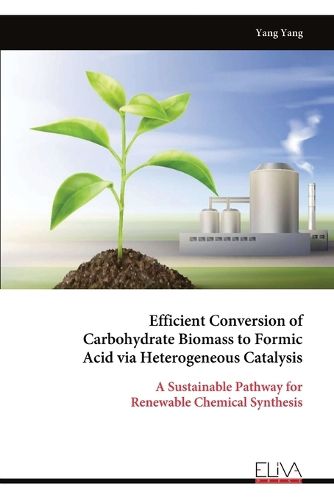Readings Newsletter
Become a Readings Member to make your shopping experience even easier.
Sign in or sign up for free!
You’re not far away from qualifying for FREE standard shipping within Australia
You’ve qualified for FREE standard shipping within Australia
The cart is loading…






This title is printed to order. This book may have been self-published. If so, we cannot guarantee the quality of the content. In the main most books will have gone through the editing process however some may not. We therefore suggest that you be aware of this before ordering this book. If in doubt check either the author or publisher’s details as we are unable to accept any returns unless they are faulty. Please contact us if you have any questions.
The conversion of biomass to chemicals/fuels has emerged as a valuable solution that offers both environmental and economic benefits, with the transformation of carbohydrate into formic acid garnering escalating scholar interest. However, the relative limited efficiency of catalyzed-oxidation or expensive cost of H2O2 and alkali in wet hydrothermal oxidation impose limitations on industrialization. This book proposed two new ideas for formic acid production by the oxidation of carbohydrate. In the first method, a two-step reaction method was developed, where the initial step is engineered to regulate the carbon chain cleavage of carbohydrates to augment the production of active intermediate. Oxygen was employed in the subsequent step as effective oxidant through free radical mechanism at around 423 K, resulting in a formic acid yield of 82.6%. Finally, the universality of the reaction was verified by using disaccharides and polysaccharides such as cellulose as substrates. In the second method, a simple but efficient MgO-H2O2 system without adding extra homogeneous base was established, achieving the highest 78.6% formic acid yield with 90.5% glucose conversion within 4 h at 323 K in water as a green medium. The catalyst MgO could be recycled five times without decline in activity with simple regeneration procedure, which occupied only 2.3% of the total operation cost based on an ex-anti life-cycle assessment, and is much cheaper than its homogenous counterpart such as LiOH. These research advance carbohydrate efficient oxidation into formic acid with heterogeneous catalyst, establishing possible approaches to produce formic acid from renewable biomass resources in real application.
$9.00 standard shipping within Australia
FREE standard shipping within Australia for orders over $100.00
Express & International shipping calculated at checkout
Stock availability can be subject to change without notice. We recommend calling the shop or contacting our online team to check availability of low stock items. Please see our Shopping Online page for more details.
This title is printed to order. This book may have been self-published. If so, we cannot guarantee the quality of the content. In the main most books will have gone through the editing process however some may not. We therefore suggest that you be aware of this before ordering this book. If in doubt check either the author or publisher’s details as we are unable to accept any returns unless they are faulty. Please contact us if you have any questions.
The conversion of biomass to chemicals/fuels has emerged as a valuable solution that offers both environmental and economic benefits, with the transformation of carbohydrate into formic acid garnering escalating scholar interest. However, the relative limited efficiency of catalyzed-oxidation or expensive cost of H2O2 and alkali in wet hydrothermal oxidation impose limitations on industrialization. This book proposed two new ideas for formic acid production by the oxidation of carbohydrate. In the first method, a two-step reaction method was developed, where the initial step is engineered to regulate the carbon chain cleavage of carbohydrates to augment the production of active intermediate. Oxygen was employed in the subsequent step as effective oxidant through free radical mechanism at around 423 K, resulting in a formic acid yield of 82.6%. Finally, the universality of the reaction was verified by using disaccharides and polysaccharides such as cellulose as substrates. In the second method, a simple but efficient MgO-H2O2 system without adding extra homogeneous base was established, achieving the highest 78.6% formic acid yield with 90.5% glucose conversion within 4 h at 323 K in water as a green medium. The catalyst MgO could be recycled five times without decline in activity with simple regeneration procedure, which occupied only 2.3% of the total operation cost based on an ex-anti life-cycle assessment, and is much cheaper than its homogenous counterpart such as LiOH. These research advance carbohydrate efficient oxidation into formic acid with heterogeneous catalyst, establishing possible approaches to produce formic acid from renewable biomass resources in real application.